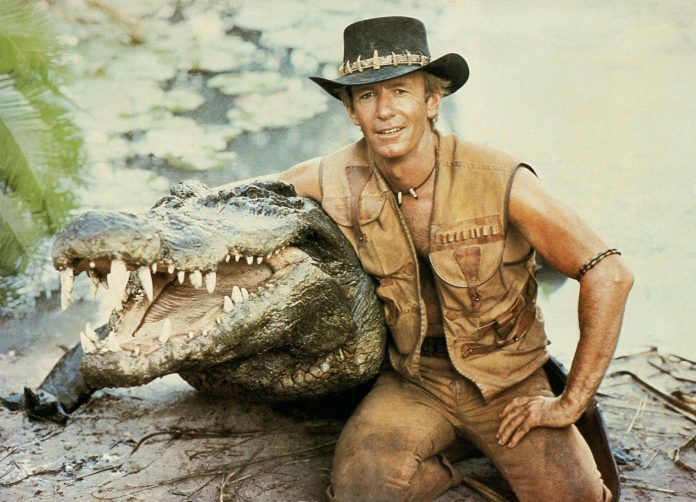My wife just creased me…
First, she had me upset as she told me an icon of our age, Crocodile Dundee star Paul Hogan, had died.
Then she added he was estimated to be over 90 and lived in a zoo. Going on, she ads on how nice it must be to live in a zoo. At this point, I’m thinking, “How can someone estimate a human’s age?” Then I was thinking, Australian, they are bad with records.
Ready to write a heartfelt post about the passing of Paul Hogan, I open the article… titled *”Star of Crocodile Dundee dies”* only to find out it’s the actual crocodile from Crocodile Dundee that died.
They say a story never loses. Meanwhile, my wife and I had practically created an entire alternative life for Paul Hogan, even lamenting how tragic it was that he passed just before Christmas.
The moral? Never trust secondhand gossip—or let your wife near the news headlines unsupervised! Otherwise, you’ll be crying crocodile tears.
Mind to be honest, the headline on ‘The Independent’ is a little bit clickbait…
https://www.independent.co.uk/…/crocodile-dundee-cast…
Paul Knaggs
The Life of a Crocodile
Crocodiles are one of the oldest living reptiles on Earth, having existed for over 200 million years. Their prehistoric lineage places them among the most resilient creatures, surviving mass extinctions and adapting to changing environments. Found in freshwater rivers, lakes, marshes, and sometimes brackish coastal waters, crocodiles lead fascinating lives governed by their predatory instincts, unique adaptations, and vital roles in their ecosystems.
Early Life
The life of a crocodile begins within the protective confines of an egg. Female crocodiles lay their eggs in nests made of vegetation or sand, which serve to incubate the eggs through natural heat. Remarkably, the temperature of the nest determines the sex of the hatchlings. Warmer temperatures generally result in males, while cooler temperatures produce females.
After an incubation period of around 80 to 100 days, the hatchlings emerge, often with the assistance of their mother, who may carefully carry them in her jaws to the water. At this stage, baby crocodiles are vulnerable to predators such as birds, fish, and even other crocodiles. Despite the mother’s protective efforts, only a small percentage of hatchlings survive to adulthood.
Growing Up
Young crocodiles feed on insects, small fish, and amphibians. As they grow, their diet expands to include larger prey. Crocodiles are ambush predators, relying on their camouflage and patience to catch unsuspecting prey. They are equipped with powerful jaws and conical teeth designed to grip rather than chew. Food is swallowed whole or torn into manageable pieces.
A crocodile’s growth is slow but steady, and their lifespan can extend up to 70 years or more. During their juvenile years, crocodiles must evade predators, including larger crocodiles, while honing their hunting skills.
Adult Life
Fully grown crocodiles are formidable predators at the top of their food chain. Depending on the species, they can reach lengths of up to 7 metres and weigh over 1,000 kilograms. Crocodiles are highly territorial, with dominant individuals claiming prime spots along riverbanks or estuaries.
Adult crocodiles maintain a diet that includes fish, birds, mammals, and occasionally carrion. They are known for their incredible strength and agility, especially in the water. A crocodile’s ability to hold its breath for up to an hour and its efficient swimming capabilities make it a master of aquatic hunting.
Behaviour and Communication
Crocodiles are social creatures to an extent, often seen basking in groups or sharing habitats. However, they are also highly competitive and territorial, particularly during mating seasons. Males use vocalisations, physical displays, and even fights to assert dominance and attract mates.
Crocodiles communicate through various sounds, including growls, hisses, and bellows. These vocalisations play a crucial role in territory defence, mating rituals, and parent-offspring interactions.
Role in Ecosystems
As apex predators, crocodiles are essential for maintaining the balance of their ecosystems. They control the populations of prey species, preventing overgrazing or overpopulation, which could disrupt aquatic habitats. Additionally, crocodiles contribute to nutrient cycling by breaking down organic matter, supporting the overall health of their environments.
Threats and Conservation
Despite their ancient resilience, crocodiles face numerous threats due to human activities. Habitat loss, pollution, and illegal hunting for their skin and meat have significantly impacted crocodile populations. Climate change, affecting nesting conditions and prey availability, poses an additional challenge.
Conservation efforts, including habitat protection, anti-poaching measures, and breeding programmes, are crucial to ensuring the survival of these remarkable reptiles. Many species, such as the critically endangered Philippine crocodile, rely on these initiatives to recover their dwindling numbers.







